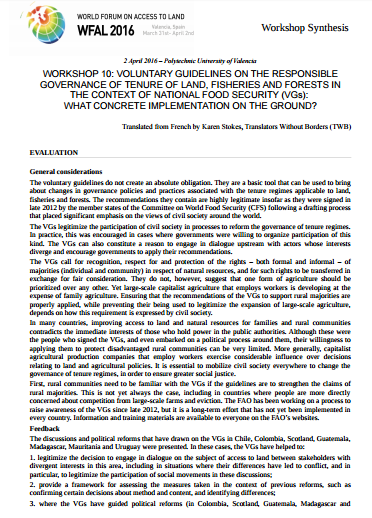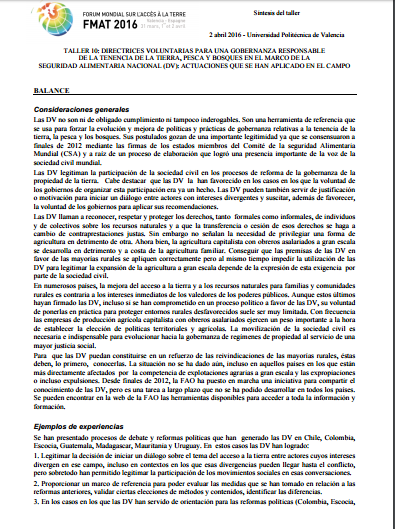direito fundiário
AGROVOC URI:
Decree on the Compensation and Resettlement of the Development Project No. 192/PM.
Article 1 - Objectives: "This decree defines principles, rules, and measures to mitigate adverse social impacts and to compensate damages that result from involuntary acquisition or repossession of land and fixed or movable assets, including change in land use, restriction of access to community or natural resources affecting community livelihood and income sources.
LEGEND Land Policy Bulletin 7
This LEGEND bulletin considers the impact that new technology can have on documenting land rights and democratising access to land data around the world.
STRENGTHENING LAND TENURE AND PROPERTY RIGHTS IN ANGOLA
Since its independence in 1975, and most notably in the last decade, Angola has struggled to create a legal framework adequate to address the complex issues relating to the country’s land. In 2004, the country enacted a new land law1 that sought to strengthen perceived areas of weakness in prior legislation. The new law delineated and expanded a range of land rights available by concession and recognized some measure of traditional land rights.
Empowering rural women in India – it’s high time!
Publicly elected women representatives in India ought to take advantage of their influence to defend women’s rights.
Why property rights matter
It is widely accepted among economists and policy-makers that secure and well-defined land property rights are integral to poverty alleviation and economic prosperity. But how do legal systems, land tenure and economic development really relate to one another? Our author demonstrates the links using her latest research results from 146 countries.
Tanzania’s Village Land Act 15 years on
The year 2016 marks 15 years since the new wave land reforms became operational in Tanzania. Despite its ambitious goals – encouraging land registration and titling, and empowering women and other vulnerable groups – the results are disillusioning. A brief overview of 15 years of implementation, using the Village Land Act as a case study.
Cambodia: Land grabs and rural dispossession by government design
The land reform process in Cambodia is full of examples of injustice and human rights violations. Promises to improve the situation of the landless and land-poor citizens have remained unfulfilled. Development co-operation efforts have not changed this either.
Making the SDGs count for land rights
Does the inclusion of land rights in the global development agenda bear the potential to promote the secure and fair distribution of land rights? Yes, our author believes – provided that the land-rights community does not rest on its laurels and really addresses the crucial aspects.
“We can‘t be satisfied yet“
On the 11th May 2012, the Committee on World Food Security of the United Nations adopted the Voluntary Guidelines on the Responsible Governance of Tenure of Land, Fisheries and Forests (VGGT). Rural 21 asked Roman Herre of the human rights organisation FIAN about his views on the implementation of the Guidelines so far.
WORKSHOP 10: VOLUNTARY GUIDELINES ON THE RESPONSIBLE GOVERNANCE OF TENURE OF LAND, FISHERIES AND FORESTS IN THE CONTEXT OF NATIONAL FOOD SECURITY (VGs): WHAT CONCRETE IMPLEMENTATION ON THE GROUND?
The voluntary guidelines do not create an absolute obligation. They are a basic tool that can be used to bring about changes in governance policies and practices associated with the tenure regimes applicable to land, fisheries and forests. The recommendations they contain are highly legitimate insofar as they were signed in late 2012 by the member states of the Committee on World Food Security (CFS) following a drafting process that placed significant emphasis on the views of civil society around the world.
TALLER 10: DIRECTRICES VOLUNTARIAS PARA UNA GOBERNANZA RESPONSABLE DE LA TENENCIA DE LA TIERRA, PESCA Y BOSQUES EN EL MARCO DE LA SEGURIDAD ALIMENTARIA NACIONAL (DV): ACTUACIONES QUE SE HAN APLICADO EN EL CAMPO
Las DV no son ni de obligado cumplimiento ni tampoco inderogables. Son una herramienta de referencia que se usa para forzar la evolución y mejora de políticas y prácticas de gobernanza relativas a la tenencia de la tierra, la pesca y los bosques. Sus postulados gozan de una importante legitimidad ya que se consensuaron a finales de 2012 mediante las firmas de los estados miembros del Comité de la seguridad Alimentaria Mundial (CSA) y a raíz de un proceso de elaboración que logró una presencia importante de la voz de la sociedad civil mundial.











